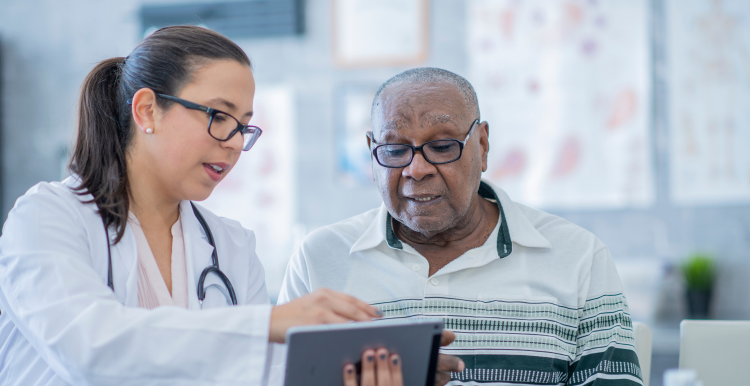Our position on GP access

Summary
Access to GPs is a longstanding public concern. GPs are usually the first port of call and gateway to being referred for specialist support. Unfortunately, people report barriers to access, poor communication from the practice, and a lack of choice.
People with disabilities, those whose first language isn’t English, and those on lower incomes have all shared stories with us about facing specific barriers to accessing GP services.
We’re calling on a formal review of GP access, so that people can get the care they desperately need. We also want the public to be able to choose the type of appointment that best meets their needs – whether that’s in person or remotely.
Our evidence
For a long time, GP access has been the most common issue people talk to us about.
The pandemic had a major impact on access to services. In some cases, these changes led to improvements, but in other ways exacerbated issues. For example, access to GP services has become easier and more convenient for those who prefer remote appointments, using digital technology. However, when people need a face-to-face appointment, they often report access becoming harder.

By December 2020, 75% of feedback we received about GP access was negative. So we analysed a range of sources, drawing on almost 200,000 people’s experiences to publish our report GP access during the Covid-19 pandemic, in March 2021.
Key themes included:
- Difficulties making a GP appointment, including waiting several weeks for a non-urgent appointment. People struggle to get through on the phone, and those who work or have caring responsibilities can find it especially difficult if they are expected to ring at 8am. When people eventually do get through, there are no appointments left.
- Due to the lack of available GP appointments, some people visit A&E, which leads to additional pressures on other services.
- People’s preferences for face-to-face appointments are not always met.
- Older people, people with limited English, those who are digitally excluded, those without access to the internet, and disabled people also face additional barriers to access, leading to increased inequalities.
- Although some people prefer digital appointments, there are still challenges. For example, poor connectivity or not being allowed to use personal technology at work.
- When people can’t access the type of appointment they want (e.g. in person or digital), or experience delays, it can have a huge impact on their mental and physical health.
What we’re calling for
-
A formal review of GP accessThe Covid-19 pandemic fundamentally shifted the way people accessed GP services. Following our report, we called for a national review of general practice to make sure changes to access across the country were not only understood but were working for everyone too.
In May 2022, we welcomed NHS England’s publication of Next Steps for Integrating Primary Care: the Fuller Stocktake. In line with our call for a review, this report looked at what was working well in primary care, what wasn’t, and how systems could accelerate the implementation of integrated primary care.
-
GP websites to be kept up-to-date
-
People’s personal communication needs to be met
-
Greater choice over the type of appointment people want
-
Better data collection to address inequalities
Read about our recommendations in greater detail.
What action we’ve taken
Throughout the pandemic, we shared our evidence with various primary care teams at NHS England and the Department of Health and Social Care.
People’s experiences key to £250 million winter access fund
In October 2021, NHS England published its plan for improving access to GP appointments. People’s experiences we shared with NHS England were cited as key to the announcement of a £250 million winter access fund to help GP teams increase the availability of same-day and face-to-face appointments.
Integrated Care Systems supporting local care
NHS England also recommended that Integrated Care Systems should review local access data, including feedback from local Healthwatch teams. There was also a commitment in the plan to work with Healthwatch England and others on a communications toolkit and the delivery of a campaign to help people understand GP access changes.
Highlighting patient feedback at every stage of the Fuller review
Having called for this review, we contributed to every stage of development, sharing up-to-date findings and policy expertise. Based on public feedback, our input included:
- Current ways of accessing care are not working for everyone. This can be down to not being able to get through on the phone, or a lack of same-day or face-to-face appointments.
- You cannot assume people’s preferences for remote appointments. Older people in rural areas have benefited, while younger people who often cannot access private spaces for appointments feel dismissed. There are also still concerns amongst patients about how effective this care can be.
- People need different types of care at different points in their life – and they need to be able to move between these depending on their condition or preference at that time. For example, speed and ease of access can be more important for new or serious care episodes. But for check-ups for long-term conditions, or where there are communication preferences, seeing the same professional may be more important.
- Continuity of care is about more than seeing the same professional at each appointment. The key is building a relationship with people, working with them, understanding their needs, and proactively following-up with them.
Next steps
We welcomed the review addressing several of these issues and will support implementation of the report’s recommendations. We will continue to feed insights into ongoing NHS England work on GP access issues, including the previously announced communications toolkit and national campaign.


